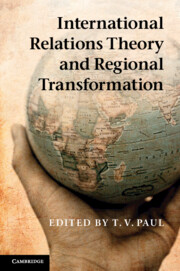Book contents
- Frontmatter
- Contents
- Figures and tables
- About the contributors
- Acknowledgments
- Part 1 Introduction
- 1 Regional transformation in international relations
- 2 How regions were made, and the legacies for world politics
- Part 2 Realist perspectives
- Part 3 Liberal perspectives
- Part 4 Constructivist perspectives
- Part 5 Eclectic perspectives
- Part 6 Conclusions
- Index
- References
2 - How regions were made, and the legacies for world politics
an English School reconnaissance
Published online by Cambridge University Press: 05 June 2012
- Frontmatter
- Contents
- Figures and tables
- About the contributors
- Acknowledgments
- Part 1 Introduction
- 1 Regional transformation in international relations
- 2 How regions were made, and the legacies for world politics
- Part 2 Realist perspectives
- Part 3 Liberal perspectives
- Part 4 Constructivist perspectives
- Part 5 Eclectic perspectives
- Part 6 Conclusions
- Index
- References
Summary
Introduction
This chapter focuses on the formation of modern regions as a precursor to the discussion of their transformation in later chapters. For those unable to think outside of positivist vocabulary, its dependent variable is the degree and character of differentiation among contemporary regional interstate societies. In line with mainstream approaches to International Relations (IR), by “region” I understand a geographically clustered subsystem of states that is sufficiently distinctive in terms of its internal structure and process to be meaningfully differentiated from a wider international system or society of which it is part. Region is a level of analysis located between the international system (global) level, and the unit (state) level. Like the state itself, region privileges a territorial mode of differentiation as a way of understanding world politics. The geographical element in the concept of region is crucial. Regions are not just any subsystem of states in an international system, but a specific type of subsystem defined by geographical clustering. The significance of geographical clustering rests on the idea that most types of interactions amongst units will travel more easily over short distances than over long ones. In historical terms, it is easy to see how invasions, migrations, pollutions, cultural penetrations, and suchlike have all worked more easily and quickly over short distances than over long ones. This means that, other things being equal, it is reasonable to expect that interactions amongst a regional cluster of states will be more intense than between those states and more distant ones. In a world historical context, this means that states and peoples who share a region are, again other things being equal, more likely to share a history and culture than are states and peoples further away from each other. By this definition, it is clear that the Commonwealth is not a region even though its members share some culture, and neither is the Alliance of Small Island States even though its members share some geographical features. Neither is the so-called “Third World”. APEC (Asia–Pacific Economic Cooperation) is sometimes referred to as a region, and so is the ASEAN Regional Forum, but both of these have memberships that are too large and too scattered to count as regions. A “region” that spans oceans and contains half the world stretches the concept beyond breaking point. Also worth noting is that regions would not exist if the political units comprising the international system were themselves mobile, as some, most notably the “barbarian” tribes of the premodern world, were. Regions presuppose that states are more or less fixed into geographic positions, and have to reach out from an anchored position.
- Type
- Chapter
- Information
- Publisher: Cambridge University PressPrint publication year: 2012
References
- 20
- Cited by



